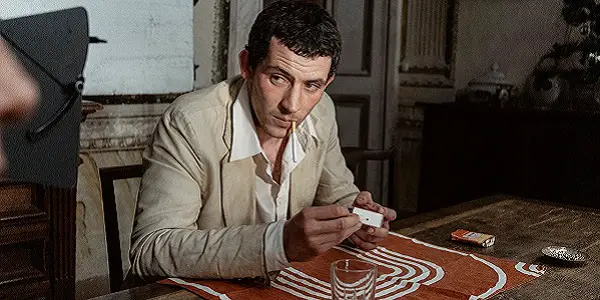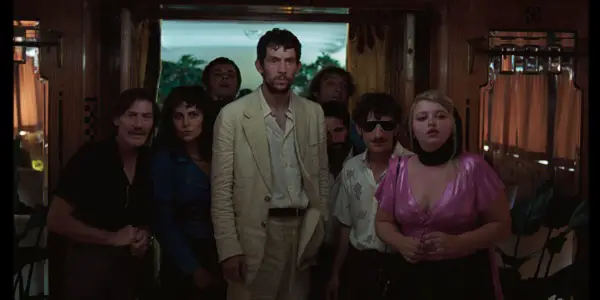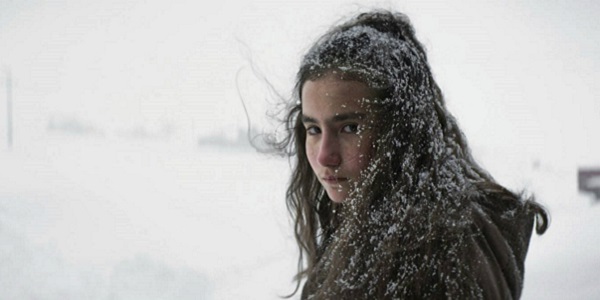New York Film Festival 2023: LA CHIMERA & ABOUT DRY GRASSES

Lee Jutton has directed short films starring a killer toaster,…
Acclaimed international auteurs Alice Rohrwacher (The Wonders, Happy as Lazzaro) and Nuri Bilge Ceylan (Winter Sleep, The Wild Pear Tree) both have films screening in the Main Slate at this year’s New York Film Festival; both films were also selected to compete for the Palme d’Or at Cannes (losing out to Justine Triet’s Anatomy of a Fall, also screening at NYFF). Both films also happen to be fascinating dramas focused on the dilemmas that plague a perpetual outsider, someone incapable of fully assimilating into the world in which they have found themselves even when opportunities are presented for them to do so. Whether it be the educated English archaeologist who sticks out like a sore thumb amongst his working-class Italian partners in crime in Rohrwacher’s La Chimera or the teacher resentful of the provincial attitudes in the small town in which he has been stationed in Ceylan’s About Dry Grasses, both films beautifully portray the alienation and isolation of such situations, rendering these largely internal struggles remarkably cinematic in scope.
La Chimera
It’s easy to understand why a character in La Chimera would come across cranky, perpetually rumpled archeologist Arthur (Josh O’Connor) and exclaim that she thought he was a ghost. After all, Arthur has one foot in the grave, both figuratively and literally. Not only is he as pale and slender as a wisp of smoke and just as likely to disappear on a sharp gust of wind—a quality accentuated by the grungy white linen suit he wears for most of the film—he also has a borderline supernatural talent for revealing underground tombs with a dowsing rod.
Arthur puts this strange skill to use leading an eccentric band of tombaroli (grave robbers) who steal Etruscan artifacts from long-forgotten tombs and sell them on the black market. But Arthur’s interest in raiding graves isn’t just financial; it’s also spiritual. With each tomb he uncovers, he hopes to find the legendary gate to the underworld and be reunited with his lost love, Beniamina (Yile Vianello).

When we first meet Arthur, he has just been released from prison and reunited with his unruly compatriots, who all too quickly get him once again involved in the activities that landed him behind bars in the first place. He also is reunited with Beniamina’s eccentric mother, Flora (the great Isabella Rossellini, who looks more and more like her mother as years go by), who believes that Beniamina is only away temporarily, much to the chagrin of the remaining members of her fleet of copper-headed daughters, all of whom appear to be far more grounded in the world of the living than either Flora or Arthur.
While at Flora’s house, Arthur meets her latest singing student-slash-servant, a lively and curious woman named Italia (Carol Duarte) who secretly has her two young children living with her in the most remote reaches of Flora’s crumbling home. Indeed, in La Chimera even the world of the living seems to be in the slow and steady process of decay. The village’s train station stands abandoned, emphasizing the purgatorial feel of Arthur’s existence there; he’s stranded somewhere between life and death.
La Chimera takes place in the 1980s, which means it has an awesome soundtrack that combines dramatic classic music with catchy electronic beats. It also looks stunning, courtesy of legendary French cinematographer and frequent Rohrwacher collaborator Hélène Louvart; she makes the flicking flame of a candle in a newly opened tomb the most haunting sight in the world. Rohrwacher cleverly and creatively plays with visual storytelling techniques to emphasize the supernatural qualities of her film’s narrative: allowing the camera to turn upside down when Arthur feels that he has encountered a tomb, having a duo of musicians periodically appear to narrate the story, and periodically cutting away to 16 mm footage of Beniamina struggling with a mysterious red thread—the thread that keeps her and Arthur tied together across the boundaries of life and death. If she keeps pulling away, will she tug Arthur with her over to the other side, guiding him to paradise as Beatrice did Dante? Or will she end up alone in the underworld while Arthur remains caught in between?

Despite so many admittedly lovely magical moments, my favorite parts of the La Chimera were the ones most grounded in the reality of Arthur’s life, especially his borderline comic escapades with the tombaroli and his gentle, tentative romance with Italia. It’s hard for me to be that invested in a love story like that of Arthur and Beniamina when one-half of the coupling spends the majority of the film deceased, especially with the delightful Duarte making Italia such an attractive option among the living. (When she shyly and casually leans her head on his shoulder at a party, I practically melted.)
As Arthur, the wonderfully wry O’Connor cuts a dashing figure in his dusty suits, cigarette perpetually dangling from his lips as he communicates in the rough Italian of the foreigner that marks him as a perpetual outsider in the village where he lives. (Who needs Indiana Jones and his Dial of Destiny when you have Arthur and his Etruscan bowls, am I right?) The entire ensemble cast is stellar, with even the most minor characters rendered full-blooded and alive by the actors portraying them. It’s all too easy to be won over by them, and by the darkly funny and deeply romantic film in which they exist.
About Dry Grasses
If you still have an appetite for the exploits of grumpy young men after La Chimera, then have I got the film for you! About Dry Grasses chronicles the misadventures of Samet (Deniz Celiloğlu), an art teacher who has spent the last four years stationed in a small village in East Anatolia, a place where the climate is so harsh that there are essentially only two seasons—winter and summer—meaning the grasses never get a chance to grow green and thrive; they remain parched and dry, trapped under the snow before being bleached by the sun. This is basically how Samet feels after spending what he feels is too much of his prime stranded in what he repeatedly refers to as a “wasteland,” but fortunately for him, he will soon be eligible to apply for a transfer, ideally to cosmopolitan Istanbul.

Unfortunately for Samet, something soon happens that puts his long-awaited move in jeopardy. He and his colleague and housemate, Kenan (Musab Ekici), are told that female students have complained that the two men behaved inappropriately towards them. The men are stunned, racking their brains to try and figure out what they might have done. Samet suspects Sevim (Ece Bağcı), a pretty and precocious young girl whom he has taken under his wing, is getting revenge on him for confiscating a love letter she had written (that was in all likelihood for him); in a moment of youthful impetuousness and embarrassment, Sevim wanted to get Samet in trouble for something, too. But this shocking betrayal on the part of his favorite student sends Samet into turmoil, leading him down a road of increasingly selfish and shortsighted acts as he attempts to piece his own shattered ego back together.
One of the innocent bystanders who gets tangled up in Samet’s self-destruction is Nuray (Merve Dizdar, who won Best Actress at Cannes for her fiery performance), another teacher whom he is first set up with before inviting Kenan along on their outings, feeling that his friend is a better match for her. Needless to say, once it appears that Nuray and Kenan have actually developed feelings for each other, Samet grows jealous and sets out to get between them.
Nuray is a radical socialist who lost a leg in a suicide bombing; she is a tough, smart, and outspoken woman, and one of the only people willing to call out Samet for his selfish, “me first” outlook. In one lengthy dinner scene, the two of them argue politics and philosophy, with Nuray speaking out in favor of solidarity while Samet counters with the importance of individuality and free thinking. Whatever side you land on in their heated debate, it’s a fascinating scene, impeccably written, that shows why Samet is in fact actually the better match for Nuray; Kenan is so smitten that he automatically agrees with whatever she says, while Samet at least poses the intellectual and emotional challenge she craves. And when Nuray says that moving to Istanbul won’t solve Samet’s problems—he’ll only take his problems to the big city with him—one knows at heart that she is right.

Ceylan’s films often require great patience on the part of the audience—but those who are patient will be deeply rewarded. About Dry Grasses is no different; the film runs over three hours and mostly features long scenes of people talking in single, static takes. Still, everything they’re talking about is guaranteed to keep you engaged, rife as it is with all-too-recognizable anxiety and tension: whether it be Samet and Kenan coercing another colleague into revealing more details about the allegations against them, Samet looking on in subtle disbelief as Kenan makes a fool out of himself in front of Nuray, or the painfully awkward final goodbye that takes place between Samet and Sevim. With the exception of Nuray, whose stubborn and confrontational attitude is at least honest, most of the characters are not that admirable, though many are uncomfortably relatable in their insecurities and petty grievances. Regardless, all of them feel painfully real.
About Dry Grasses is a portrait of human behavior in all of its complexities and contradictions, so it makes sense that Ceylan, who is also a photographer, uses the art of portraiture as a motif throughout the film; Nuray channels her energy and emotion into striking drawings of people she encounters, while Samet, who once dreamed of being an artist himself, spends his free time taking intimate portraits of the other villagers. The film features several interludes of these portraits, some of which look a tad uncanny due to the almost too high quality of the digital camera used to take them, but they are nonetheless compelling.
When the film isn’t focused on human faces, the silent truths they convey, and the secrets they hold close, it is on the wide, wintry landscape of East Anatolia. The skies, mountains, and plains are all the same cold shade of greyish white, like dirty snow, rendering the landscape monotonous yet strangely beautiful. As much as you can understand why it would be a tough place to live, it’s hard to take Samet seriously when he calls it a wasteland; that he feels that way tells us more about him than it does the place itself. The film concludes with a tacked-on epilogue and voiceover from Samet that I found largely unnecessary, but otherwise, About Dry Grasses is an entirely engrossing epic of everyday life.
Conclusion:
If you’re looking for films that will make you think and feel in equal measure – in other words, everything great films should do – look no further than La Chimera and About Dry Grasses.
La Chimera and About Dry Grasses are screening as part of the Main Slate at the 2023 New York Film Festival.
Does content like this matter to you?
Become a Member and support film journalism. Unlock access to all of Film Inquiry`s great articles. Join a community of like-minded readers who are passionate about cinema - get access to our private members Network, give back to independent filmmakers, and more.
Lee Jutton has directed short films starring a killer toaster, a killer Christmas tree, and a not-killer leopard. Her writing has appeared in publications such as Film School Rejects, Bitch: A Feminist Response to Pop Culture, Bitch Flicks, TV Fanatic, and Just Press Play. When not watching, making, or writing about films, she can usually be found on Twitter obsessing over soccer, BTS, and her cat.













